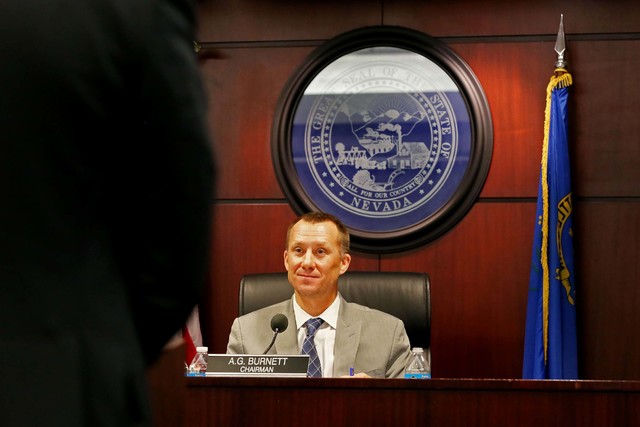Nevada gaming board refers proposal on money laundering to staff
The state Gaming Control Board will refer a proposal to strengthen money-laundering regulations for Nevada sports books to its staff to determine if it would create additional burdens on its tax and audit divisions.
The board on Thursday conducted a workshop on a proposed regulation that was unusual in that it was generated by petition from a licensee. Board members were concerned that the proposal urged in a petition by Mesquite Gaming was motivated by competitive reasons.
Representatives of Mesquite Gaming told regulators they wanted them to close a loophole involving sports wagering payouts in excess of $10,000 from satellite books that commonly exist in rural locations.
Richard Tomasso, vice president of security and government affairs for Mesquite Gaming, which operates the Casablanca and Virgin River properties in Mesquite, said the issue began when the board and the state agreed to follow federal policies of the Financial Crimes Enforcement Network about 10 years ago.
The FinCEN procedures do not include policies for satellite sportsbooks with less than $1 million in annual gross gaming revenue requiring the filing of Internal Revenue Service forms on cash wagers and payouts in excess of $10,000.
“We believe the current practice of exempting these satellites from reporting winning sports book wagers of $10,000 or higher facilitates money laundering, increases the risk of criminal activity through third-party betting, impedes the efforts of law enforcement in identifying such activity and could potentially damage the integrity of gaming in the state of Nevada,” Mesquite Gaming’s corporate compliance officer, Catherine Catanzaro, said in a July letter to regulators.
In testimony Thursday, Tomasso said revisions to existing state regulations “would close the back door and leave criminal activity no out.”
Control Board attorneys opted to propose revisions to the state’s Regulation 22 on race books and sports pools rather than draft a new regulation.
When questioned by Control Board members A.G. Burnett, Shawn Reid and Terry Johnson, it became clear that Mesquite Gaming had additional motivation to seek regulatory change: The company’s only competitor in the market, the Eureka Hotel and Casino, located near the Virgin River property, has a satellite sports book that handles less than $1 million a year, operated by William Hill US, which has 104 sportsbooks across the state.
Attorney Scott Scherer, representing William Hill, said Mesquite Gaming’s beef should be with FinCEN and the Bank Secrecy Act of 1985, not state regulators.
Scherer also said money laundering, in part, is about risk assessment and there isn’t enough third-party and layoff sports wagering occurring for a criminal to attempt to launder money. He added that the company’s bookies are trained to check identification on large payouts and that big-money bettors are required to fill out additional paperwork and verify Social Security numbers.
Money laundering can occur when a bettor wagers both sides of a bet, getting close to the same amount that was wagered.
He urged the board to reject Mesquite Gaming’s petition.
Mesquite Gaming also sent a letter to FinCEN in Vienna, Virginia, about the issue.
The chief of the Control Board’s Enforcement Division, Karl Bennison, agreed that modifying the state’s regulation would “complete the picture and would not be burdensome” on his officers.
But board members opted not to place the proposed regulatory change on a future meeting agenda, concurring instead to review the proposal with its Tax and License and Audit divisions, which could need additional manpower to review paperwork that would be generated with the regulatory changes.
Contact Richard N. Velotta at rvelotta@reviewjournal.com or 702-477-3893. Follow @RickVelotta on Twitter.

















